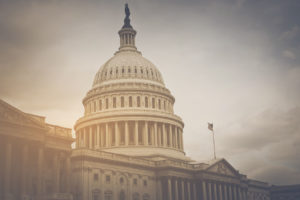 We fight to protect the separation of church and state, elevate humanists and humanism and support civil and human rights in Congress and in the administration by supporting and opposing legislation, rules, executive actions, and by empowering our membership to act on issues that matter to humanists.
We fight to protect the separation of church and state, elevate humanists and humanism and support civil and human rights in Congress and in the administration by supporting and opposing legislation, rules, executive actions, and by empowering our membership to act on issues that matter to humanists.
Growth and Coalition Building
- Coalition Work: The AHA continues to coordinate with a breadth of coalitions, such as the Secular Coalition for America and the Leadership Conference on Civil and Human Rights, to ensure action is taken at the federal level on several key initiatives, which has included signing onto letters addressed to elected and nonelected officials, participating in and encouraging members to join organizing efforts such as rallies, and amplifying resources, information, and issue-based campaigns to our networks on social media. We collaborated with nearly 100 like-minded progressive organizations, amplifying our voice and advocating for humanist values in various spheres, particularly in areas concerning church-state separation and combatting Christian nationalism.
Legislative and Policy Advocacy
- Health Share Transparency Act: We actively worked alongside coalition partners to advance this crucial legislation, aiming to ensure transparency and accountability in health share programs.
- National Day of Reason Resolution: We successfully worked to reintroduce the National Day of Reason resolution, sponsored by Representative Jamie Raskin (D-MD), which proclaims the central importance of reason in the betterment of humanity.
- Challenging the National Prayer Breakfast: Together with partners, we pressed for a removal of harmful lobbying influence from the National Prayer Breakfast, championing a fair and inclusive platform.
International Engagement
- Humanists International’s Freedom of Thought Report Launch: Our collaboration facilitated a notable event on Capitol Hill, featuring esteemed guests including US Congressmen, State Department ambassadors, and individuals persecuted for their beliefs, underscoring our commitment to global humanist solidarity.
- Strengthened Governmental Relationships: We bolstered ties with influential entities such as the US Commission on International Religious Freedom (USCIRF) and the State Department Office of International Religious Freedom, enhancing our advocacy on behalf of humanists and nonbelievers worldwide.
Public Awareness and Advocacy Campaigns
- Judicial Reform Advocacy: We advocated for judicial reform, explicitly coming out in support of court expansion. As part of this advocacy, we were cosponsors of the Just Majority bus tour, to demand a fair and ethical court.
- Informing Congress: We reached out to members of Congress on issues relative to reforming the judiciary (SCERT, Judiciary Act), church-state separation (HSTA), and numerous issues that speak to humanist values such as abortion access, environmental sustainability, and LGBTQIA issues. We tackled pressing issues such as the Texas “Ten Commandments” bill and advocated for mandatory reporting by clergy in Washington, underscoring our commitment to secular governance and accountability.
- Multiple Recovery Options: We worked to advance “Multiple Recovery Options” bills in New York and in Michigan, and worked to advance a few other state level initiatives. Related to the combatting of religious privilege, the bills require courts to let defendants know they have a right to recovery option programs that are secular in nature.
Community Engagement and Growth
- Grassroots Advocacy: The AHA has helped provide a voice to humanists across the country by crafting Action Alerts. Our outreach efforts resulted in a significant increase in humanist involvement, with over 2,200 new supporters joining our cause, and a total of 9,384 advocates amplifying our message on issues including reproductive freedom, LGBTQ+ rights, separation of church and state, judicial reform, and much more.
- Town Hall Discussions: We hosted engaging town hall discussions on reigning in the Supreme Court and discussed upcoming cases and legislative initiatives critical to safeguarding humanist values.
- Campaigns and Petitions: We launched 28 campaigns and petitions, including impactful initiatives such as the Supreme Court Ethics, Recusal, and Transparency (SCERT) campaign, which garnered 993 actions, reflecting our community’s active engagement and commitment to advocacy.
Continued Learning and Collaboration
- Coalition Work: We signed on to nearly 100 coalition letters with like-minded progressive organizations, helping to cement our spot as experts on church-state separation and Christian nationalism within the greater movement. We also expanded our network by joining seven new coalitions and listservs, ensuring that we stay active, informed and engaged on critical issues ranging from gun violence to climate action and AI ethics.
Advocacy Outreach and Grassroots Mobilization
- Congressional Engagement: At the onset of the 118th Congress, we initiated advocacy efforts by sending 200 letters to Hill offices, urging them to join the Congressional Freethought Caucus in support of humanist values in policymaking.
Future Outlook
As Christian nationalism continues to expand its reach and power within government, our work to hold the line between church and state will become more critical than ever. The upcoming 2024 election presents unique challenges that may make our work even more difficult and treacherous, as well as a few upcoming court decisions that could fundamentally alter democracy. We will continue to expand our work deeper into the states with the goal of beginning to track key state legislatures and taking action locally. Our ultimate goal is to ensure that Christian nationalism and anti-pluralistic agendas that harm the values humanists hold dear are defeated and humanism is instead promoted.